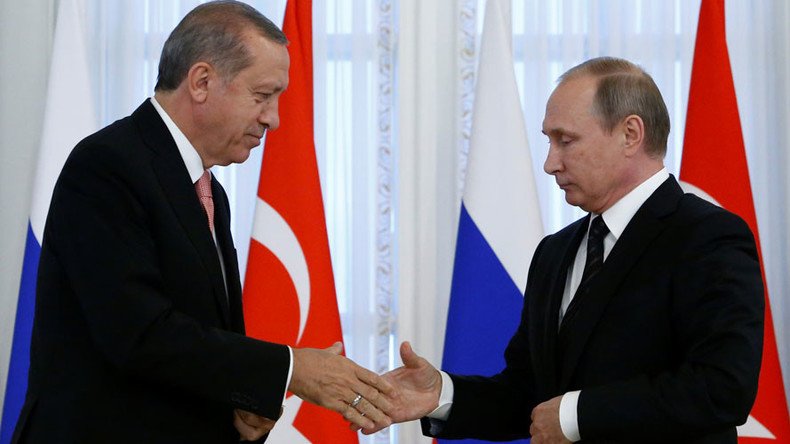As Turkey changes geopolitical course, will Syria begin to heal?

Even as the world is haunted by the humanitarian crisis gripping two million besieged residents of Aleppo, a shift in regional political alignment is afoot in the Middle East with positive signs for ending the catastrophic war.
After years of pursuing a failed foreign policy of trying to topple Syrian President Bashar Assad by enabling Islamist extremists, Turkey is embarking on an about-turn and warming up to Assad’s patrons— Russia and Iran.
Turkish Prime Minister Binali Yildirim announced last week he is leveraging newly repaired ties with Russia and Iran to develop a stabilization plan in which Assad will remain in power for the “short-term” and be part of political negotiations. For Turkey to concede that Assad will stay, at least for some time, is a massive comedown from the earlier obstinate position he had to depart immediately and by any means.
#Russia could use #Incirlik airbase 'if necessary' – Turkish PM https://t.co/ChB0kcIS3ypic.twitter.com/adcObybttk
— RT (@RT_com) 21 августа 2016 г.
Since the beginning of the Syrian war in 2011, Ankara had been at odds with Moscow and Tehran by openly abetting a torrent of armed Sunni Islamist fighters to gather inside Turkey and then cross over into northern Syria to wage holy war against the Shiite Assad’s regime.
Turkey’s President, Recep Tayyip Erdogan, allied with Qatar and other Sunni Arab monarchies to spawn a dizzying array of anti-Assad and anti-Iranian rebel groups, including branches and affiliates of Al-Qaeda and Islamic State (IS, formerly ISIS/ISIL).
This interventionist approach was based on a mixture of neo-Ottoman tendencies— wherein Turkey wished to retake control over its former colonized spaces in Syria and Iraq — and domestic political calculations — whereby Erdogan could consolidate conservative Sunni majority votes in Turkey behind his Islamist Justice and Development Party (AKP).
In spite of well-meaning warnings that becoming the launching ground for a transnational jihad in Syria (where over 40,000 foreign fighters hailing from more than 100 countries have converged) would prove costly for Turkey, Erdogan stubbornly entrenched it as a front-line state in the anti-Assad coalition.
But as the war dragged on with no defeat of Assad in sight, it became clear that Turkey was playing with fire. A series of terrorist attacks, including chilling suicide bombings in Ankara and Istanbul, have shaken the security of ordinary Turks. Mass casualty attacks attributed to IS have grown in regularity, the most recent of which happened in Gaziantep on August 20 and claimed over 50 lives, leaving Erdogan red-faced.
URGENT: 8 dead, 30 wounded in suspected suicide attack at wedding ceremony in Gaziantep, Turkey — local media https://t.co/VpA1LG4IWx
— RT (@RT_com) 20 августа 2016 г.
The same Islamist terror which he wanted to use as an instrument for Turkey to attain regional hegemony had come back to haunt like a Frankenstein’s monster. Unable to halt a wave of terrorism and ensnared in another war against Turkey’s Kurdish minorities, he had no option but to sidle up to Russia and Iran and consider dropping the proxy war against Assad.
Notwithstanding smug Western predictions that Russia would fold under the pressure of low oil prices and economic sanctions, and that its military campaign to keep the Syrian state intact would falter, Turkey is bowing to the reality that the joint front of Russia and Iran is a powerful one which must be accommodated rather than opposed.
For a savvy politician like Erdogan, crucial foreign policy decisions are driven both by geostrategic and domestic factors. The unsuccessful but scary military coup attempt against him in July has convinced him that the US is utilizing dissidents like the Pennsylvania-based mystic Fethullah Gulen to weaken his absolute hold on power in Turkey.
Erdogan’s choice of Russia and Iran for diplomatic engagement after the coup was suppressed is a clear message to the West that he will not accept externally dictated limits on his Sultan-like concentrated absolutism in Turkey. Seemingly abandoning the anti-Assad bandwagon, which features prominent US allies like Saudi Arabia and Qatar in the lead, could thus be a rebuff to Washington from an Erdogan who is paranoid about American tricks to oust him.
As long as Turkey was in the anti-Assad camp alongside the Sunni Gulf monarchies which tacitly tolerate Israel but openly hate Shiite Iran, the interconnected wars in Syria and Iraq had an irredeemable sectarian outlook. Extreme bloodshed and brutality by IS, Al-Qaeda as well as Shiite parties to the conflict entrenched hard feelings and made the wars intractable.
Now that Turkey appears to have learned its lesson by admitting that no “permanent solution” is possible without Iran and Russia, there is a glimmer of hope for weakening the Salafist and Wahhabi hordes that had earlier been pouring into Syria and Iraq to perform holy war against Shiites and their benefactor-in-chief, Iran.
IS and Al-Qaeda cannot sustain their turf in Syria and Iraq if Turkey switches off their pipelines. Once these hardcore Islamists, presently sustaining losses due to Russian and American aerial bombing, are marginalized there is a reasonable chance of a political solution to emerge. Assad himself might ultimately be eased out, as Iran and Russia are not averse to any endgame that preserves the secular Syrian state and protects their regional interests.
#AleppoBoy: Bloody, ash-covered child brings home horror of #Syria conflict to the world https://t.co/smvL7x73qX
— RT (@RT_com) 18 августа 2016 г.
Whether the Saudis, Qataris and Kuwaitis will stop financing Islamist terrorists or not remains the million-dollar question. The answer depends on how sincerely and effectively the US can tame these spoiled allies whose oil and gas wealth have been put at the service of shady jihadist causes. But if Turkey no longer coordinates with the Gulf kingdoms, they would be geographically constrained to keep destabilizing Syria and Iraq.
Faces of devastation like Omran Daqneesh and Aylan Kurdi are tragic on-the-ground outcomes of high-level power politics and regional rivalries that have ripped apart Syria and Iraq. If Erdogan’s Turkey has realized its folly and walks out of the death trap it set for itself, one can be cautiously optimistic that better times lie ahead.
The statements, views and opinions expressed in this column are solely those of the author and do not necessarily represent those of RT.













